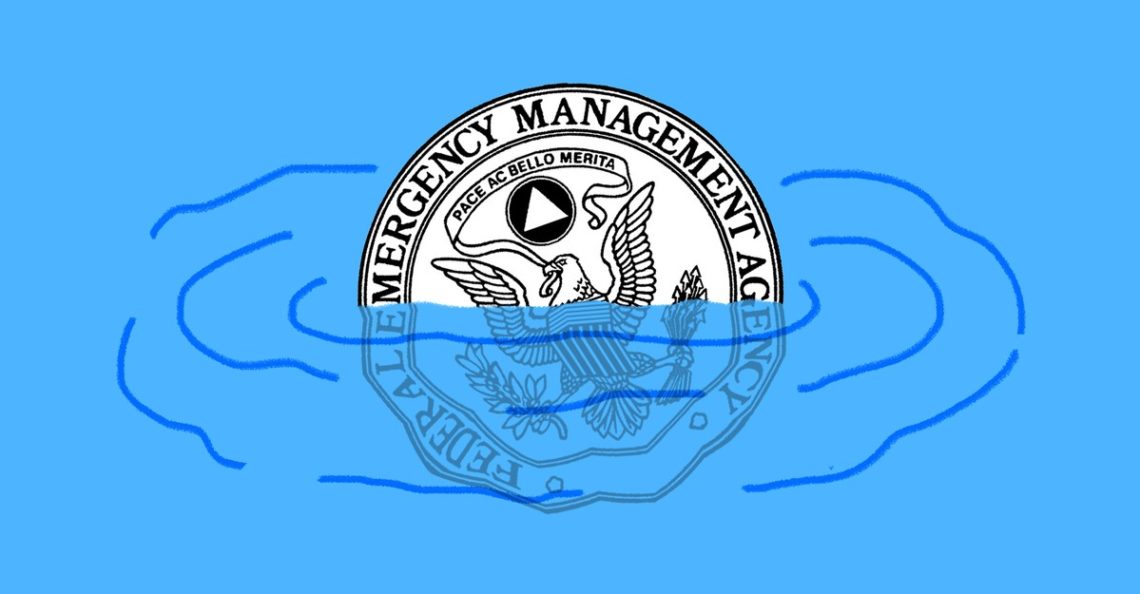FEMA now has an end date. President Donald Trump said yesterday that he intends to phase out the Federal Emergency Management Administration after this hurricane season, canceling it like an HBO series. States should lead their own disaster response, he said, suggesting he does not understand that states already do lead disaster response; they just can’t do it without an infusion of FEMA dollars and expertise when the disaster is too big. “The governor should be able to handle it,” Trump said. The buck has been passed.
The Atlantic hurricane season lasts from now until November. The National Oceanic and Atmospheric Administration is predicting an above-normal number of named storms this year. The weather doesn’t stop after that, of course. Fire season overlaps with hurricane season, another time of intense FEMA activity, and in recent years, fires have broken the bounds of any usual seasons; the devastating Los Angeles fires were in January. Even if this year’s disasters do quiet after November, hurricane season starts again next June. The administration will convene a council to eliminate FEMA “as it exists today,” Kristi Noem, the secretary of Homeland Security, said yesterday—but those few short months in between seasons are hardly enough time to dismantle the federal apparatus of disaster response and transfer full responsibility to the states without casualties. Literal casualties, potentially. (FEMA did not respond to a request for comment.)
But, fine, we get FEMA for this hurricane season. Already, it will be a test of what happens when FEMA is hobbled and anemic. Under the Trump administration, the agency has lost roughly a quarter of its core staff. One acting chief of FEMA was pushed out after saying that the agency should not be abolished; his replacement told staffers he wasn’t aware that the United States had a hurricane season. (The administration later said this was a joke.) Should any single storm—or, worse, multiple storms—turn into a major disaster this year, the responsibility that state governments might be expected to shoulder in a FEMA-less America could come as a shock to them, and to their constituents.
Many close watchers of FEMA do think the agency needs a dramatic shake-up and that states should be responsible for more of the financial burden of catastrophe. FEMA was originally intended to handle a relatively small number of catastrophic disasters a year, but now deals with many dozens annually, both because the rate of disasters is increasing and because the agency is being drafted into handling more of them. The ballooning costs of response and recovery regularly exceed FEMA’s main disaster budget, requiring emergency and ad hoc funding to bridge the gap.
Meanwhile, states have come to rely on federal funds to bail them out and, in the quiet moments between storms and fires, are free to make imprudent development decisions: Might as well let developers build those waterfront homes if FEMA will pick up the tab when they flood. “Our system creates some really perverse incentives that need to be addressed,” Andrew Rumbach, a senior fellow at the nonprofit Urban Institute, told me. More risk should be transferred to the states, he and others said.
But that would take time to do safely, and require a major infusion of cash to the states to bolster any FEMA-replacing infrastructure, according to the experts I spoke with. Ending FEMA, as Trump says he will, could easily result in a highly uneven landscape of disaster safety.
The logic for FEMA was all about efficiency: For many states, disasters are rare, and having 50 sets of personnel and resources on standby for those rare events is far more costly than having a centralized stockpile that can be deployed around the country as needed. Good disaster response also requires time spent in disaster mode. States with infrequent disasters naturally lack that. FEMA’s strength is that it deals with crises all the time.
That experience is part of what the agency is now losing. Many senior personnel, including those who coordinate responses during emergencies, have left since January, according to The New York Times. Those decades of experience aren’t easy to replace, Jeffrey Schlegelmilch, an associate professor at Columbia University who has worked in disaster planning, told me. “Emergency management isn’t something where you take a few courses and all of a sudden you can run a complex emergency.” And in states that don’t regularly handle floods or hurricanes, staff, “won’t have the muscle memory” of how to respond when a storm suddenly intensifies, North Carolina Governor Josh Stein said in a press conference last week. He said his state experienced this firsthand when Hurricane Helene hit western North Carolina last year: That part of the state had “a lot of new people in emergency-management positions,” he said. “We need the expertise that exists in FEMA.”
Wealthier states, such as California, and states that, like Florida, have extensive experience in response coordination may not be as hurt by changes at the federal level. Florida Governor Ron DeSantis has said his state doesn’t need FEMA; just give Florida a chunk of money instead. (Trump’s intention to end FEMA does not yet clearly include major transfers of funds to states to run their own response and recovery programs; he said yesterday that future funds may come directly from the “president’s office,” rather than FEMA.) Rumbach says he heard that same desire from officials in Kentucky, when he taught an emergency-management training workshop there. “Their main argument was ‘We don’t need FEMA. Just give us the money; we know what to do with it.’”
Poorer states and states that scarcely see disasters will inevitably be most vulnerable to FEMA’s total absence. Arizona, for example, has received among the fewest FEMA funds in recent years, in part because it isn’t in the path of hurricanes and recent wildfires have not burned as ferociously there as in other western states. But that means the state is ill-prepared for a low-probability but high-devastation event, as The Arizona Republic recently noted. If and when Arizona’s luck runs out, it may not have the infrastructure or the funds to manage the crisis alone.
“You’re going to see a lot of states not prepared. And a lot of people in harm’s way may not be fully capable of recovering if there is an event,” Carlos Martín, a vice president at Resources for the Future, an environmental think tank, told me. Plus, an every-state-for-themselves approach comes with the obvious challenges of a free market: At present, FEMA stockpiles essential goods to distribute after emergencies. If that stockpile isn’t maintained, wealthier states could handily outcompete poorer states for supplies during multistate emergencies, according to the Atlantic Council, which found that red states are likely to be on the losing side most.
This all means that more citizens may fall through the disaster-assistance cracks. FEMA has said, for instance, that it will stop its door-to-door outreach this season and rely instead on “more targeted venues”; when a federal disaster is declared, FEMA often goes around the area and knocks on every person’s door to let them know what programs they could apply to for assistance. Now, Rumbach worries, people living in the most rural places, as well as people who may not be mobile—the elderly and those with certain disabilities—may never know about those programs. “A lot of the stories about how badly things went are going to come out later,” he said.
Even in a state with personnel on the ground to capture the full scope of need, a lot of disaster response after that step is paperwork, Schlegelmilch said. Right now, an entire private-sector ecosystem of organizations helps states apply for FEMA funds, and helps FEMA direct its resources. Even if states are on their own, they will still need a system to do something similar. Remaking grant-application processes and managing the bureaucracy of distributing funds will be yet another growing pain of the transition. “That’s going to shock all of the states,” Schlegelmilch said.
If Trump were to decide that reforming FEMA were a more prudent choice than scrapping it, ideas abound. As FEMA’s administrator during Barack Obama’s presidency, Craig Fugate promoted the idea of a “disaster deductible” for states modeled off insurance deductibles; state officials might then be held more accountable for preparing for disasters (which right now tends to mean little to voters) rather than rewarded politically for acquiring disaster funding after the fact. The previous Trump administration created a fund (which Joe Biden expanded) meant to help states prevent the worst impact of disasters before they happen. That program moved billions in funds under local control, with the aim of fixing long-standing infrastructure problems that would have made future disasters more dangerous and expensive. But Trump already canceled it this term. “It’s hard to see how they’re not increasing risk,” Rumbach said. “We’re going to pay for it one way or another.”
For all these reasons, Rumbach is betting that “reality will set in,” and that the federal government will not radically shrink its share of disaster spending so quickly. But the loss of key personnel and the looming dissolution mean that major damage to national readiness has already been done. And the hasty budget changes mean some people will get hurt. The country’s emergency-management system “doesn’t have to be completely broken to have really bad impacts,” he said. If the national ability to respond to disasters falters at all, then “recovery is slower, more chaotic, less efficient,” Rumbach said. “When that happens, people are suffering for longer, they’re more traumatized, communities don’t recover as quickly.”
The United States has already seen what happens when a major weather catastrophe arrives shortly after a president hastily rearranges FEMA. After the newly formed Department of Homeland Security took over the agency in 2003, George W. Bush’s administration eliminated emergency managers and resources, particularly in regional offices. When Hurricane Katrina hit in 2005, the depleted agency badly botched the response. “We’ve read this story before,” Schlegelmilch said. There’s little reason to think it’ll end differently this time around.
The post FEMA’s Last Hurricane Season appeared first on The Atlantic.




